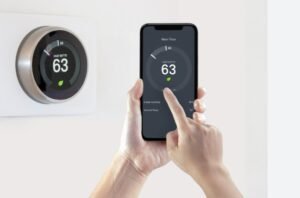Air Purifier vs Dehumidifier
Did you know poor indoor air quality contributes to mold growth, water damage, increased energy costs, and reduced system performance over time? Many homeowners know the importance of indoor air quality to their health and home, but they struggle with choosing between an air purifier vs dehumidifier to improve their home’s environment. While both devices enhance air quality, they serve different purposes. Understanding their differences can help you determine which one is best for your needs.
What’s the Difference Between an Air Purifier and a Dehumidifier?
Air Purifier
An air purifier works by removing airborne particles such as dust, pollen, pet dander, smoke, and bacteria. It uses filters, ionizers, or UV light to clean the air. This device is ideal for individuals with allergies, asthma, or respiratory conditions.
Dehumidifier
A dehumidifier reduces excess moisture in the air, preventing mold, mildew, and musty odors. It helps maintain a comfortable humidity level, especially in humid climates, which is beneficial for homes prone to dampness or condensation issues.
Air Purifier vs Dehumidifier: Which One Do You Need?
Choose an Air Purifier If:
- You suffer from allergies or asthma.
- You want to remove airborne pollutants like dust, pollen, and smoke.
- You have pets and need to reduce pet dander.
- You’re concerned about airborne bacteria and viruses.
Choose a Dehumidifier If:
- Your home feels excessively humid or has condensation on windows.
- You notice mold, mildew, or musty odors in your home.
- You want to prevent moisture-related damage to furniture and walls.
- You live in a humid climate and want to improve comfort.
Is It Possible to Need Both?
In some cases, using both devices together provides the best results. If you have high humidity levels and allergy concerns, combining an air purifier and a dehumidifier can create a healthier indoor environment.
Key Benefits of an Air Purifier vs Dehumidifier
Air Purifier Benefits
- Removes airborne allergens and pollutants.
- Reduces odors from pets, smoke, and cooking.
- Helps prevent the spread of airborne viruses and bacteria.
- Improves overall respiratory health.
Dehumidifier Benefits
- Prevents mold growth and reduces musty smells.
- Lowers indoor humidity for greater comfort.
- Protects furniture and walls from moisture damage.
- Reduces dust mite populations, which thrive in high humidity.
Common Questions About Air Purifiers and Dehumidifiers
Can I Use an Air Purifier and a Dehumidifier Together?
Yes! An air purifier removes pollutants, while a dehumidifier controls moisture levels. Using both can optimize indoor air quality, especially in humid environments.
Which One is Better for Mold Prevention?
A dehumidifier is more effective at preventing mold because it removes excess moisture, which mold needs to grow. However, an air purifier can help reduce airborne mold spores that can circulate through your home.
Do Air Purifiers Help with Humidity?
No, air purifiers do not control humidity. They focus on removing airborne contaminants, while dehumidifiers specifically reduce moisture in the air.
Are Dehumidifiers Good for Allergies?
Yes, dehumidifiers help by reducing mold and dust mites, which are common allergy triggers. However, air purifiers are more effective at removing airborne allergens.
Professional Help to Improve Indoor Air Quality
Air purifiers and dehumidifiers are powerful tools for enhancing indoor air quality, but they can also be a significant investment. At Rocket City Air, our expert team will assess your indoor air concerns and recommend the best solutions for your home, taking the guesswork out and saving you time and money in the long-run.
- Air Quality Testing: Identify pollutants and allergens to create a tailored air improvement plan, optimizing your air quality.
- Dehumidifiers & Humidifiers: Maintain ideal moisture levels to prevent mold and improve comfort based on air quality test results.
- Air Purifiers & UV Light Systems: Eliminate bacteria, viruses, and airborne contaminants for a healthier environment, based on air quality test results.
- Maintenance & Repair: HVAC maintenance, ventilation upgrades, duct cleaning, and more to ensure long-term efficiency, saving both time and money down the road.
In Summary
Deciding between an air purifier vs dehumidifier depends on your specific indoor air quality concerns. For instance, if you struggle with allergies, an air purifier would be the best choice since it removes dust, mold spores, and other common allergens from the air. On the other hand, if you struggle with excess moisture, a dehumidifier is the best choice since it helps prevent mold and damage inside your home. In many situations, using both devices together may provide the best results. If you’re unsure which option is right for you, schedule a professional air quality test! The experts at Rocket City Air in Huntsville, AL, are ready to help you optimize your indoor air quality and feel confident in the air you breath!
Check out our related blogs!
Air Quality Testing Near Me: Breathe Easier in Huntsville
“Yellow Mold” in Air Vents? Here’s What You Need to Know





